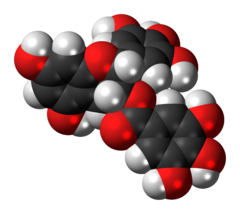Epigallocatechin gallate
 |
|
 |
|
| Names | |
|---|---|
|
IUPAC name
[(2R,3R)-5,7-dihydroxy-2-(3,4,5-trihydroxyphenyl)chroman-3-yl] 3,4,5-trihydroxybenzoate
|
|
|
Preferred IUPAC name
(2R,3R)-5,7-dihydroxy-2-(3,4,5-trihydroxyphenyl)-3,4-dihydro-2H-1-benzopyran-3-yl 3,4,5-trihydroxybenzoate
|
|
| Other names
(-)-Epigallocatechin gallate
|
|
| Identifiers | |
|
989-51-5 |
|
| 3D model (Jmol) | Interactive image |
| ChEBI |
CHEBI:4806 |
| ChEMBL |
ChEMBL297453 |
| ChemSpider |
58575 |
| ECHA InfoCard | 100.111.017 |
| 7002 | |
| MeSH | Epigallocatechin+gallate |
| PubChem | 65064 |
|
|
|
|
| Properties | |
| C22H18O11 | |
| Molar mass | 458.372 g/mol |
| Appearance | |
| soluble (33.3-100 g/L) | |
| Solubility | soluble in ethanol, DMSO, dimethyl formamide at about 20 g/l |
|
Except where otherwise noted, data are given for materials in their standard state (at 25 °C [77 °F], 100 kPa).
|
|
|
|
|
| Infobox references | |
Epigallocatechin gallate (EGCG), also known as epigallocatechin-3-gallate, is the ester of epigallocatechin and gallic acid, and is a type of catechin.
EGCG, the most abundant catechin in tea, is a polyphenol under basic research for its potential to affect human health and disease. EGCG is used in many dietary supplements.
It is found in high content in the dried leaves of white tea (4245 mg per 100 g), green tea (7380 mg per 100 g) and, in smaller quantities, black tea. During black tea production, the catechins are mostly converted to theaflavins and thearubigins. via polyphenol oxidases.
Trace amounts are found in apple skin, plums, onions, hazelnuts, pecans and carob powder (at 109 mg per 100 g).
When taken orally, EGCG has poor bioavailability even at such a high amount of daily intake equivalent to 8–16 cups of tea (800 mg), a dose causing mild adverse effects, such as nausea or heartburn. After consumption, EGCG blood levels peak within 1.7 hours, then are excreted into the urine over 3–15 hours.
EGCG has been the subject of a number of basic and clinical research studies investigating its potential use as a therapeutic for a broad range of disorders. As of 2015, however, these effects remain unsubstantiated in humans and there are no approved health claims for EGCG in the United States or Europe. The US Food and Drug Administration has issued warning letters against marketers of products claiming that EGCG provides anti-disease effects or overall health benefits.
...
Wikipedia
